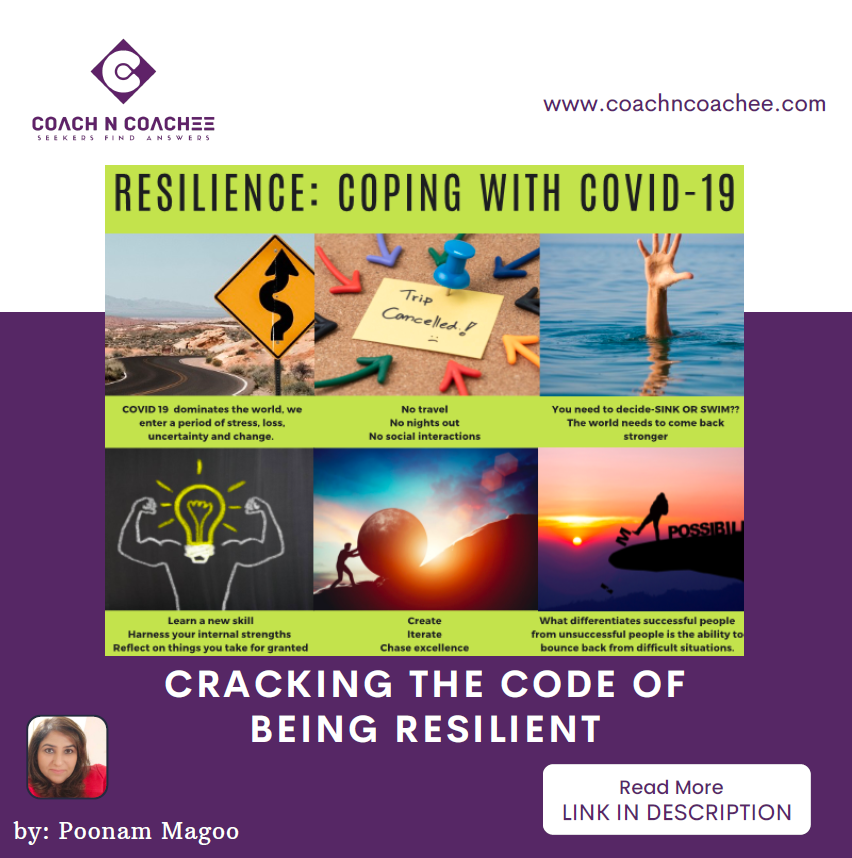
CRACKING THE CODE OF BEING RESILIENT
The word ‘resilience’ originated from the Latin word resilire, meaning to rebound. It is crucial to build resilience to be equivalent to a ‘bouncy ball’ equipped with energy and skills required to emerge stronger from adversity. Moreover, resilience is the ability of an entity to prepare for hardships, rebound from failures and crisis, and flourish from struggle. We feel inspired and motivated by numerous resilient people around us. We tend to role model these people because we resonate with their resilience. Hence, people from all walks of life can use the codes developed below to build resilience and harness their internal strengths.
To further build on the relevance of resilience in life, let’s explore the example of floods. The river Nile is the longest river in the world that flows across Egypt. In addition, the river allowed ancient Egyptians to flourish by farming. Throughout the summer season, when all rivers were drying up due to the intense heat, the river Nile covered the whole of Egypt in a flood. It is widely believed that floods disrupt lives by creating enormous loss and destruction. However, floods are also vital to restore the fertility of the land for farming. Furthermore, floodplains have several advantages like recharging the groundwater and creating desirable habitats for local wildlife. Similarly, we encounter unavoidable floods in our lives. So, it is crucial to be prepared and build the skill of resilience before the occurrence of these floods. Also, the way we perceive and respond to adversity results in whether floods lead to personal growth or negative thought traps. Lastly, some hardships have several positive effects on our lives that we tend to overlook due to our biases.
Firstly to be resilient, we need to accept that pain, fear and suffering are inevitable. Our lives are often disrupted by phenomena like globalization, climate change, economic shocks, civil disturbance, and biological weapons. However, resilient humans are capable of extracting wisdom from pain, courage from fear, and strength from misery. In the present, we are in the midst of a deadly pandemic but it is necessary to use this struggle period to build deep reservoirs of strength. So that when the world restarts after the pandemic, humans come back stronger.
Code#1 it is essential to change your trajectory in a positive direction when faced with difficult situations/circumstances that are beyond your control.
Once adversity occurs, the most important thing is acceptance. Next, it is essential to think flexibly and try complex-problem solving methods. We can either give up and sulk during struggle or use strength to recover stronger from a crisis. We would be tempted to follow the easy path of excuses, accusing, and self-pitying. The other path is difficult but transformational, as humans tend to face adverse situations and grow wiser and stronger. We can create the life we desire by taking full responsibility for every moment in our lives. Moreover, accountability makes humans pioneers instead of victims. Having a victim mindset can negatively affect progress and eventually diminishes resilience. On the other hand, a pioneer has the ability to create his/her path towards excellence by adjusting to the hardships.
Code#2 Resilience has to be practiced by making tough choices that lead to excellence.
The fundamental necessity of resilient people is to be aware of their emotions. The negative feelings associated with an adversity may be due to the beliefs about what happened rather than the event itself. Hence, it is possible to build resilience by actually identifying the beliefs and consequences of the adversity to determine the negative emotions surfacing. We all experience both positive and negative emotions. Similarly, resilient people cannot numb their negative emotions. With time we must become aware of the emotions we feel during an adversity and effectively manage these emotions.
Code#3 It is important to be emotionally intelligent during hardships.
Of course, it is not possible for us to always act wisely because we are humans. We tend to have emotional breakdowns during crises. We are unable to control our emotions, actions, and behaviour. This often leads to impulse reactions that we may regret in the future. On the other hand, resilient humans can accept uncertainty and control impulse reactions.
Code#4 Avoid making impulsive decisions that can have long-term detrimental effects.
Some of our impulse reactions are based on deep-rooted underlying beliefs. Hence, it is essential to first identify and challenge these beliefs to build resilience. These are mostly general beliefs applicable to various crises. Mostly, we have deep-rooted beliefs related to achievement, acceptance, and control. If we are achievement-oriented, then our underlying beliefs are related to success, goals and perfectionism. Conversely, some of us yearn for acceptance, and appreciation by others. On the other hand, some of us are control-oriented who believe in our ability to control events. These deep-rooted beliefs can subconsciously heighten emotional reactions at times of a crisis.
Code#5 Identify and transform a core set of deep-rooted beliefs to effectively respond to crises.
We all have different unique ways of recovering from a crisis. We tend to have personal resilience needs depending on our preferences, upbringing, and beliefs. So, after identifying these resilience needs, we need to determine which relationships help us cultivate resilience. We should spend time and seek guidance from a plethora of people who can provide diverse perspectives on our struggles. Positive relationships aid us to buffer stressful situations, obtain advice and manage adversity to maintain a sense of balance and well-being in our lives.
Code#6 substantial investment in relationships broadens our mind-map and possible choices to bounce back from adversity.
Our perspective about the severity of adversity plays a key role in building resilience. It is important to embody the challenge perspective that allows us to look at struggle as an opportunity for growth and self-improvement. It’s possible to utilize Zoom Out, a visualization technique to recover from the adversity in our lives. Simply, zoom out of yourself, out of your room, out of your house, out of your city, out of your country, out of the continent, out of the world, out of the ozone layer until you reach the moon and have a clear vision of the planet earth. Then, focus on your adversity and you will be able to realize that with all the problems and suffering in the world, your problem isn’t a serious predicament.
Code#7 Understand the real severity of the adversity by placing your problem into a bigger context.
The resilience spirit can be strengthened by monitoring progress in goals. It is suggested that having plans and tracking progress has a positive impact on goal attainment. However, comparing goals progress with others can have detrimental effects on motivation. Lastly, reflecting on your journey of progress is what pushes you forward and helps in embracing challenges.
Code#8 resilience thrives on monitoring and tracking goal progress.
In conclusion, resilience is a wonderful trait to develop as it improves your realistic optimism, complex problem-solving skill, ability to effectively manage emotions and impulse reactions, and ability to make realistic plans to recover from an adversity. Finally, cultivating a resilience spirit can make you unstoppable and help you emerge stronger from any crisis.









